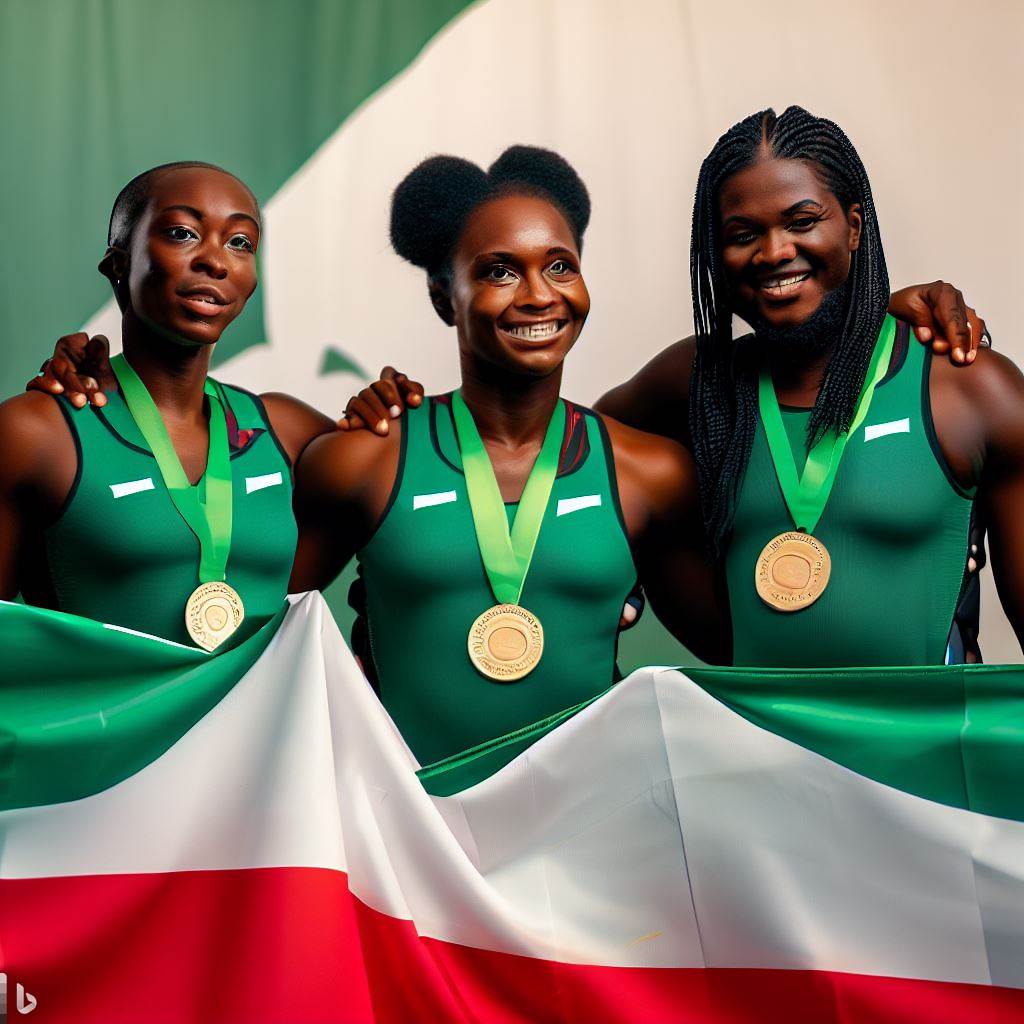Introduction
Sports medicine is an important aspect of healthcare that deals with the prevention, diagnosis, and treatment of injuries related to physical activities.
It is a multidisciplinary field that encompasses the expertise of physicians, physiotherapists, trainers, and nutritionists to ensure the optimal physical performance of athletes.
In Nigeria, sports medicine is gaining importance due to the growing interest in sports and physical fitness. With a population of over 200 million people, Nigeria has a large pool of potential athletes who need proper medical care and attention.
Sports medicine specialists are therefore needed to provide medical support and ensure the safety and well-being of athletes.
Apart from professional athletes, sports medicine is also important for recreational sports enthusiasts and the general population.
Physical activity is essential for maintaining a healthy lifestyle, and sports medicine can help individuals prevent injuries, recover from injuries, and improve their overall physical performance.
Sports medicine also plays a crucial role in the management of chronic conditions such as diabetes, hypertension, and obesity.
Physical activity is an integral part of the treatment of these conditions, and sports medicine specialists can help tailor exercise regimens to ensure patients can safely engage in physical activity.
Most importantly, sports medicine is a vital aspect of healthcare in Nigeria, with a growing need for specialists in the field.
Proper medical attention and care are essential for the well-being of athletes, sports enthusiasts, and the general population.
Should be an integral part of Nigeria’s healthcare system to ensure optimal physical performance and a healthy population.
Read: A Close Look at the Nigerian Professional Sports Infrastructure
Sports Medicine Education in Nigeria
Sports medicine is a growing field in Nigeria, and there are several institutions that offer courses in this area of medicine.
If you are interested in pursuing a career in sports medicine in Nigeria, here are some things to consider.
Available Programs and Institutions
There are several institutions that offer programs in sports medicine in Nigeria. Some of these institutions include:
- University of Lagos
- Lagos State University
- University of Ilorin
- Babcock University
- Madonna University
Admission Requirements and Process
The admission requirements and process for sports medicine programs in Nigeria vary depending on the institution. However, some common requirements include:
- A minimum of five credits in O’level subjects including Mathematics, English, and Chemistry
- A score of at least 200 in the UTME (Unified Tertiary Matriculation Examination)
- Meeting the cut-off mark for the institution of choice
- Possession of an acceptable diploma or degree certificate for direct entry into the program
After meeting these requirements, prospective students can apply for admission to the institution of their choice.
They will need to provide their academic qualifications, birth certificate, passport photograph, and any other required documents. The admission process usually involves a screening and interview process.
Curriculum and Courses
The curriculum and courses for sports medicine programs in Nigeria are designed to provide students with the knowledge and skills needed to work in the field. Some courses that may be included in the curriculum include:
- Sports Medicine and Rehabilitation
- Anatomy and Physiology
- Exercise Physiology
- Biomechanics
- Sports Psychology
- Pharmacology
- Emergency Medicine and First Aid
- Prevention and Management of Sports Injuries
The curriculum may also include practical sessions where students can gain hands-on experience in real-life situations.
This practical experience is essential for students to gain the skills needed to work in the field of sports medicine.
In review, sports medicine education is an emerging field in Nigeria with several institutions offering programs.
Prospective students must meet the admission requirements and undergo a screening process.
The curriculum is designed to provide students with a solid foundation in sports medicine, with courses covering areas such as anatomy, physiology, and sports psychology.
Practical sessions are also included to give students hands-on experience in the field.
Read: Steps to Building a Career in Nigeria’s Sports Field
Sports Medicine Career Opportunities in Nigeria
Sports medicine is a rapidly growing field in Nigeria, with many opportunities for interested individuals.
With the increase in sports activities and athletes, the need for sports medicine professionals is also on the rise.
In this chapter, we will explore some job prospects, areas of specialization, and work settings for sports medicine professionals in Nigeria.
Job Prospects in Sports Medicine
- Sports Medicine Physician: A physician who specializes in the diagnosis, treatment, and rehabilitation of sports-related injuries.
- Athletic Trainer: A person who provides preventive and rehabilitative services for athletes.
- Physical Therapist: A healthcare professional who specializes in the treatment of musculoskeletal and neuromuscular disorders.
- Sports Scientist: A professional who applies scientific principles and techniques to improve sports performance.
- Sports Medicine Nurse: A registered nurse who specializes in the care of sports-related injuries.
The above-listed job prospects are just a few of the many opportunities available for sports medicine professionals in Nigeria.
The demand for qualified professionals in this field is growing rapidly, and the potential for career growth and development is substantial.
Areas of Specialization in Sports Medicine
- Orthopedic Sports Medicine: Specializing in the treatment of musculoskeletal injuries such as fractures, dislocations, and sprains.
- Sports Nutrition: Focusing on the dietary needs and requirements of athletes.
- Exercise Physiology: Explaining the physiological effects that physical activity has on the human body.
- Sports Psychology: Focusing on the mental and emotional aspects of sports performance.
- Sports Biomechanics: Analyzing the mechanical principles of movement in sports.
Another area of specialization is rehabilitation, focusing on the recovery process after a sports-related injury or surgery.
Prospective sports medicine professionals can choose a specialization based on their interests and career goals.
Work Settings for Sports Medicine Professionals
- Sports Organizations: Working with professional sports teams, school sports programs, or amateur sports organizations.
- Healthcare Facilities: Working in hospitals, clinics, or private practices.
- Research Institutions: Conducting research in sports medicine, biomechanics, or exercise physiology.
- Sports Technology: Working with companies that develop technology for sports performance monitoring and improvement.
- Sports Media: Providing commentary or analysis on sports events, or serving as medical experts for sports media outlets.
The work settings for sports medicine professionals are diverse, and there are many opportunities for them to choose from.
Each setting offers unique challenges and rewards, and professionals can choose a work environment that aligns with their interests and career goals.
The field of sports medicine in Nigeria presents a plethora of opportunities for job prospects, areas of specialization, and work settings.
The demand for sports medicine professionals is on the rise, and there is a need for highly qualified and skilled individuals in this field.
Prospective sports medicine professionals can choose a specialization that aligns with their interests and career goals and choose a work setting that offers unique challenges and opportunities for growth and development.
Read: Nigeria’s Athletics Professions: Potential and Pitfalls
Challenges Facing Sports Medicine Practice in Nigeria
Sports medicine practice plays a critical role in promoting the health and well-being of sportsmen and women, but the practice faces notable challenges in Nigeria.
Limited facilities and equipment
One of the significant challenges facing sports medicine practice in Nigeria is the lack of adequate facilities and equipment.
Many sports medicine practitioners in Nigeria work with outdated and inadequate facilities and equipment, making it difficult to provide quality care to athletes.
Additionally, due to the limited resources available, most sports medicine facilities are concentrated in urban areas, leaving many rural athletes with little or no access to essential care.
As a result, many athletes in Nigeria face prolonged recovery periods or even permanent disabilities due to inadequate medical attention.
Lack of government recognition and support
Another significant challenge facing sports medicine practice in Nigeria is a lack of recognition and support from the government.
Despite the significant role that sports play in promoting national development, healthcare policies in Nigeria rarely prioritize sports medicine, leaving many practitioners to operate without adequate support.
As a result, most sports medicine facilities are either private or reliant on external funding, making it difficult for these facilities to provide affordable care to athletes.
Additionally, the lack of clear regulations and guidelines on sports medicine in Nigeria further undermines the quality of care provided to athletes.
Limited awareness and advocacy
Finally, the limited awareness and advocacy around sports medicine practice in Nigeria presents a significant challenge.
Many Nigerians, including athletes and coaches, have limited understanding about the value of sports medicine and the role it plays in promoting performance and preventing injuries.
As a result, many athletes either ignore medical advice or seek care from unqualified practitioners, leading to prolonged injuries and disabilities.
Additionally, the low awareness levels regarding sports medicine in Nigeria weaken support for the practice, making it difficult for practitioners to access funding and other resources to improve the quality of care.
In short, while sports medicine practice has enormous potential for promoting the health and well-being of athletes in Nigeria, the practice faces significant challenges.
The limited facilities and equipment, lack of government recognition and support, and the low awareness levels all undermine the quality of care provided to athletes.
As such, addressing these challenges requires a multi-pronged approach, involving both the government and private sector stakeholders.
The government must prioritize sports medicine in healthcare policies and support the development of adequate facilities and equipment.
At the same time, advocacy campaigns should focus on raising awareness among Nigerian athletes and coaches about the value of sports medicine.

Find Out More: Athletic Directors: Nigeria’s Sports Development Leaders
Strategies to Enhance Sports Medicine Practice in Nigeria
Sports medicine is an essential field in Nigeria, given the country’s growing interests in sports and healthy living.
The significance of sports medicine in Nigeria cannot be overemphasized, as it cuts across different aspects of sports, including injury prevention, rehabilitation, and treatment of sports-related injuries.
However, despite the growing awareness of the importance of sports medicine, there are still numerous challenges that impede its practice in Nigeria.
Some of these challenges include inadequate facilities and equipment, lack of awareness, and insufficient collaborations with stakeholders.
To overcome these challenges and enhance sports medicine practice in Nigeria, the following strategies can be implemented:
Advocacy and Awareness Campaigns
One crucial area that needs attention is the creation of awareness about sports medicine in Nigeria.
Advocacy campaigns can be used to educate the public, athletes, coaches, and other stakeholders about the importance of sports medicine.
These campaigns can be done through various media platforms, such as television, radio, social media, and print media.
The aim is to provide comprehensive education about sports medicine to different audiences and increase their awareness of the need to prioritize it.
Collaboration with Stakeholders
The field of sports medicine requires active collaboration between various stakeholders to achieve the desired results.
Stakeholders such as sports associations, medical bodies, government agencies, and other groups need to work together to enhance sports medicine practice in Nigeria.
For instance, sports associations and medical bodies can collaborate to provide adequate training for sports physicians, coaches, and other stakeholders on sports medicine.
Also, government agencies can provide the necessary policy framework and funding to support the development of sports medicine.
Provision of Adequate Facilities and Equipment
Another essential strategy to enhance sports medicine practice in Nigeria is the provision of adequate facilities and equipment.
Sports medicine practitioners need suitable facilities and equipment to do their jobs effectively.
The availability of these resources will ensure that athletes receive the best possible care during and after sporting events.
Therefore, the government, sports associations, and other stakeholders must invest in providing adequate facilities and equipment for sports medicine practice in Nigeria.
Overall, the field of sports medicine is critical to the development of sports in Nigeria.
The implementation of the above strategies will be instrumental in enhancing sports medicine practice in Nigeria.
It will also go a long way in preventing and treating sports-related injuries, ultimately leading to better performance among athletes.
Read: Breaking Down Nigeria’s Athletics Training Systems
Conclusion
Summary of key points
- The growth of sports in Nigeria has created opportunities for sports medicine professionals.
- There is a need to increase awareness of sports medicine among athletes and coaches in Nigeria.
- Proper training and education of sports medicine professionals is crucial to ensuring effective treatment of injuries.
- The government and private organizations need to invest in sports medicine to improve the overall health of Nigerian athletes.
Call to action for stakeholders
Stakeholders in the Nigerian sports industry must work together to improve the availability and accessibility of sports medicine services in the country.
This includes investing in the education and training of sports medicine professionals and providing athletes with access to appropriate medical care.
Coaches and athletes should also be encouraged to prioritize injury prevention and seek immediate medical attention when necessary.
Future prospects for sports medicine in Nigeria
The future of sports medicine in Nigeria is promising, as the industry continues to grow and there is increasing recognition of the importance of proper medical care for athletes.
However, there is still much work to be done to ensure that athletes receive the best possible care and that the field of sports medicine continues to advance.
With dedicated effort and investment, Nigeria has the potential to become a major player in the global sports medicine industry.




